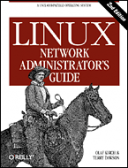Книга: Linux Network Administrator Guide, Second Edition
TCP Extensions: used with -m tcp -p tcp
TCP Extensions: used with -m tcp -p tcp
- -sport [!] [port[:port]]
Specifies the port that the datagram source must be using to match this rule. Ports may be specified as a range by specifying the upper and lower limits of the range using the colon as a delimiter. For example, 20:25 described all of the ports numbered 20 up to and including 25. Again, the! character may be used to negate the values.
- -dport [!] [port[:port]]
Specifies the port that the datagram destination must be using to match this rule. The argument is coded identically to the - -sport option.
- -tcp-flags [!] mask comp
Specifies that this rule should match when the TCP flags in the datagram match those specified by mask and comp. mask is a comma-separated list of flags that should be examined when making the test. comp is a comma-separated list of flags that must be set for the rule to match. Valid flags are: SYN, ACK, FIN, RST, URG, PSH, ALL or NONE. This is an advanced option: refer to a good description of the TCP protocol, such as RFC-793, for a description of the meaning and implication of each of these flags. The! character negates the rule.
[!] - -syn
Specifies the rule to match only datagrams with the SYN bit set and the ACK and FIN bits cleared. Datagrams with these options are used to open TCP connections, and this option can therefore be used to manage connection requests. This option is shorthand for:
- -tcp-flags SYN,RST,ACK SYN
When you use the negation operator, the rule will match all datagrams that do not have both the SYN and ACK bits set.
- UDP headers
- UDP characteristics
- TCP REMOTE BUFFER
- Conventions used in this document
- Appendix D. TCP options
- Terms used in this document
- TCP characteristics
- TCP headers
- What NAT is used for and basic terms and expressions
- Using Double Quotes to Resolve Variables in Strings with Embedded Spaces
- TCP connections
- Drawbacks with restore




